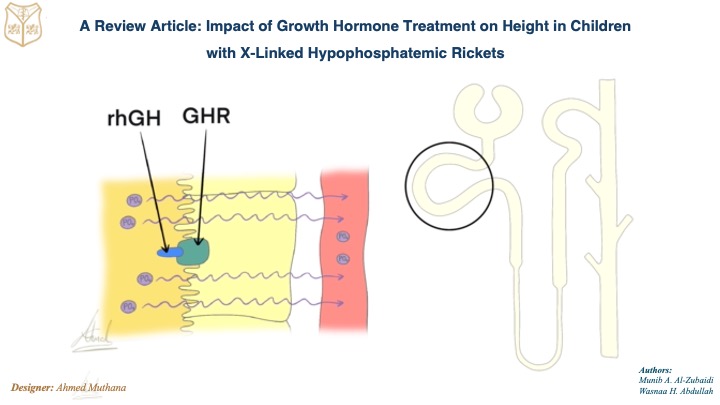Review Article: Impact of Growth Hormone Treatment on Height in Children with X-Linked Hypophosphatemic Rickets
DOI:
https://doi.org/10.32007/jfacmedbaghdad.6632349Keywords:
Growth hormone, Rickets, Short stature , X-linked dominant, X-Linked Hypophosphatemic.Abstract
Background: X-linked hypophosphatemic rickets (XLHR) is the most frequent form of inherited rickets. In children, stunted growth and disproportionately short stature are frequently the early signs of XLHR.
Objective: To review different opinions in the review of literature about the use of growth hormone in the treatment of XLHR.
Methods: This review article followed a systematic literature review approach, there are
no exclusion criteria.
Main Findings: Growth retardation may continue even after receiving appropriate conventional treatment (phosphate supplements and active analogs of vitamin D) in XLHR, even if it is initiated early in childhood. Recently, regardless of a well-controlled disease, treatment with recombinant human growth hormone (rhGH) was suggested as an effective way of supporting growth in children with XLHR exhibiting a lack of growth. It is necessary to follow until reaching adult height to assess the long-term effects of rhGH treatment on the ultimate height.
Conclusion: The addition of rhGH to optimal medical treatment might represent a promising option in the significant portion of affected patients with XLHR and growth failure. Follow-up is needed until the final height is reached to evaluate the long-term benefit of rhGH treatment on final height. Further studies will be necessary to determine the most efficient treatment protocol concerning doses, duration, and age of initiation or rhGH in short children with XLHR. However, further studies would be needed to study the addition of rhGH to optimal medical treatment in short children with XLHR.
Received: March 2024
Revised: Aug. 2024
Accepted: Aug 2024
Downloads
References
Laurent MR, Harvengt P, Mortier GR, Böckenhauer D. X-linked hypophosphatemia. GeneReviews®[Internet]. 2023 Dec 14. Available from: https://www.ncbi.nlm.nih.gov/books/NBK83985/
André J, Zhukouskaya VV, Lambert AS, Salles JP, Mignot B, Bardet C, et al. Growth hormone treatment improves final height in children with X-linked hypophosphatemia. Orphanet Journal of Rare Diseases. 2022;17(1):1-8.
https://doi.org/10.1186/s13023-022-02590-5 PMid:36544157 PMCid:PMC9768884
Haffner D, Emma F, Eastwood DM, Duplan MB, Bacchetta J, Schnabel D, et al. Clinical practice recommendations for the diagnosis and management of X-linked hypophosphataemia. Nature Reviews Nephrology. 2019; 15(7):435-55.
https://doi.org/10.1038/s41581-019-0152-5 PMid:31068690 PMCid:PMC7136170
Cannalire G, Pilloni S, Esposito S, Biasucci G, Di Franco A, Street ME. Alkaline phosphatase in clinical practice in childhood: Focus on rickets. Frontiers in Endocrinology. 2023; 14:1111445. https://doi.org/10.3389/fendo.2023.1111445 PMid: 36817604 PMCid:PMC9931734
Rothenbuhler A, Esterle L, Gueorguieva I, Salles JP, Mignot B, Colle M, et al. Two-year recombinant human growth hormone (rhGH) treatment is more effective in pre-pubertal compared to pubertal short children with X-linked hypophosphatemic rickets (XLHR). Growth Hormone & IGF Research. 2017;36:11-5. https://doi.org/10.1016/j.ghir.2017.08.001 PMid: 28822957
Chande S, Bergwitz C. Role of phosphate sensing in bone and mineral metabolism. Nature Reviews Endocrinology. 2018; 14(11):637-55. https://doi.org/10.1038/s41574-018-0076-3 PMid:30218014 PMCid:PMC8607960
Cagnoli M. Spontaneous growth and effect of early therapy with calcitriol and phosphate in X-linked hypophosphatemic rickets. Pediatr Endocrinol Rev. 2017; 17:119-22. https://doi.org/10.17458/per.vol15.2017.crb.spontaneousgrowtheffect
Beck-Nielsen SS, Mughal Z, Haffner D, Nilsson O, Levtchenko E, Ariceta G, et al. FGF23 and its role in X-linked hypophosphatemia-related morbidity Orphanet Journal of Rare Diseases. 2019;14:1-25. https://doi.org/10.1186/s13023-019-1014-8 PMid: 30808384 PMCid:PMC6390548
Baroncelli GI, Mora S. X-Linked hypophosphatemic rickets: Multisystemic disorder in children requiring multidisciplinary management. Frontiers in Endocrinology. 2021;12: 688309
https://doi.org/10.3389/fendo.2021.688309 PMid: 34421819 PMCid:PMC8378329
Trombetti A, Al-Daghri N, Brandi ML, Cannata-Andía JB, Cavalier E, Chandran M, et al. Interdisciplinary management of FGF23-related phosphate wasting syndromes: a consensus statement on the evaluation, diagnosis and care of patients with X-linked hypophosphataemia. Nature Reviews Endocrinology. 2022; 18 (6):366-84. https://doi.org/10.1038/s41574-022-00662-x PMid:35484227
Rothenbuhler A, Schnabel D, Högler W, Linglart A. Diagnosis, treatment-monitoring and follow-up of children and adolescents with X-linked hypophosphatemia (XLH). Metabolism. 2020;103:153892. https://doi.org/10.1016/j.metabol.2019.03.009 PMid: 30928313
Laurent MR, De Schepper J, Godefroid N, Levtchenko E, Vande Walle J. Consensus recommendations for the diagnosis and management of X-linked hypophosphatemia in Belgium. Frontiers in endocrinology. 2021 Mar 19;12:641543. https://doi.org/10.3389/fendo.2021.641543 PMid: 33815294 PMCid: PMC8018577
Živičnjak M, Schnabel D, Billing H, Staude H, Filler G, Querfeld U, et al. Age-related stature and linear body segments in children with X-linked hypophosphatemic rickets. Pediatric Nephrology. 2011; 26:223-31.
https://doi.org/10.1007/s00467-010-1705-9 PMid: 21120538
Yakar S. Insulin-like growth factors: Actions 1 on the skeleton. J Mol Endocrinol 2018; 17‑0298. https://doi.org/10.1530/JME-17-0298
Živičnjak M, Schnabel D, Staude H, Even G, Marx M, Beetz R, et al. Three-year growth hormone treatment in short children with X-linked hypophosphatemic rickets: effects on linear growth and body disproportion. J Clin Endocrinol Metab. 2011;96(12):E2097-105. https://doi.org/10.1210/jc.2011-0399 PMid:21994957
Seikaly MG, Brown R, Baum M. The effect of recombinant human growth hormone in children with X-linked hypophosphatemia. Pediatrics. 1997; 100(5):879-84. https://doi.org/10.1542/peds.100.5.879 PMid:9346990
Haffner D, Nissel R, Wuhl E, Mehls O. Effects of growth hormone treatment on body proportions and final height among small children with X-linked hypophosphatemic rickets. Pediatrics. 2004;113(6):e593-6.
https://doi.org/10.1542/peds.113.6.e593 PMid:15173542
Baroncelli GI, Bertelloni S, Ceccarelli C, Saggese G. Effect of growth hormone treatment on final height, phosphate metabolism, and bone mineral density in children with X-linked hypophosphatemic rickets. J Pediatr.2001;138(2):236-43. https://doi.org/10.1067/mpd.2001.108955 PMid: 11174622
Carpenter TO, Whyte MP, Imel EA, Boot AM, Högler W, Linglart A, et al. Burosumab therapy in children with X-linked hypophosphatemia. N Engl J Med. 2018; 378: 1987-98. https://doi.org/10.1056/NEJMoa1714641 PMid: 29791829
Imel EA, Glorieux FH, Whyte MP, Munns CF, Ward LM, Nilsson O, et al. Burosumab versus conventional therapy in children with X-linked hypophosphataemia: a randomised, active-controlled, open-label, phase 3 trial. The Lancet. 2019;393(10189):2416-27. https://doi.org/10.1016/S0140-6736(19)30654-3 PMid:31104833
Ertl DA, Le Lorier J, Gleiss A, Trabado S, Bensignor C, Audrain C, et al. Growth pattern in children with X-linked hypophosphatemia treated with burosumab and growth hormone. Orphanet Journal of Rare Diseases. 2022;17(1):1-2. https://doi.org/10.1186/s13023-022-02562-9 PMid: 36371259 PMCid: PMC9652849
Smith S, Remmington T. Recombinant growth hormone therapy for X-linked hypophosphatemia in children. Cochrane Database Syst Rev. 2021; 10(10).https://doi.org/10.1002/14651858.CD004447.pub3 PMid: 34618915 PMCid:PMC8496964

Downloads
Published
Issue
Section
License
Copyright (c) 2024 Munib A. Al-Zubaidi , Wasnaa H. Abdullah

This work is licensed under a Creative Commons Attribution 4.0 International License.











 Creative Commons Attribution 4.0 International license..
Creative Commons Attribution 4.0 International license..


